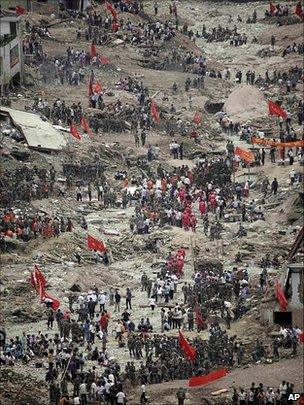Chinese town reeling after landslide
- Published

Rescuers and residents have been searching through the mud and debris
To get inside the town of Zhouqu, you have to pick your way gingerly across the mud and the sludge.
It is hard to find firm footing. You soon learn to spot the rocks or planks of wood that will offer some support.
The streets look like river beds - with muddy water still pouring down from the hillsides above, and stones and other debris scattered across them.
As we made our way in, a stream of local people headed out, to find relatives or others who could shelter them.
Most carried just one bag - it seems that hardly anything had been salvaged.
The wave of mud washed over this small town in a moment in the early hours of Sunday morning.
Survivors say there was a crack like thunder, and then the buildings shook as if there was a small earthquake.
It had been raining hard for hours. The sludge swallowed up the town in seconds.
Family trapped
Families were buried alive in their beds. The mud enveloped them as they slept.
Chen Yu Han's legs are badly bruised. She was trapped for 24 hours but survived.
She sits on the rocks outside what was her apartment building and waits, as she has done every day since the disaster.
Chen Yu Han lost her whole family. Her three teenage daughters and her husband were buried when the mud hit the building.
"We were trying to get them out when the mud came, but it blocked the door too quickly," she says. "I escaped but they couldn't."
She knows her children are gone, but she wants to see them one last time.
'Victims all over'
So she watches every move of the rescuers carefully, squatting almost motionless at times, staring intently at the workers sorting through the rubble.
The doctor treating her wounds is Wang Bao Hong. "The biggest problem we face is the victims are all over the place, we can't keep track of them," he says. "We just try to treat whoever we can."
There are now a lot of boots on the ground in the town.
As well as the soldiers, many of them armed only with a shovel or a pickaxe for their assault on the mounds of mud, there are rescue professionals, sniffer dogs and medics combing through the wreckage.
If they suspect they might have found a possible survivor, the soldiers sprint up the precarious ridges formed by the sludge and start digging furiously.
We spent most of the day in Zhouqu on Tuesday, but only saw bodies being brought out.
At one point work was halted. We were told to move away from the buildings - some of which look like they have been wrenched out of their foundations and ripped apart as if they were made of paper.
One appears to have been flattened by a giant fist.
More rain expected
The soldiers were planning an explosion to relieve pressure on a temporary lake formed by the debris.
Soldiers have used explosives to try to unblock flood water
The bang, when it came, appeared distant and unremarkable.
The rescue professionals in their orange jumpsuits were soon back at work.
All day, relatives of those missing sat on mounds of rubbish and mud and waited as the digging continued.
Some cried or wailed or just collapsed into the arms of friends or family.
Others joined the rescuers as they tried to find clues - a mobile phone or clothing that might give some sense of what had happened to those they had lost.
The destruction wrought by the weather in China this year is the worst since 1998 in terms of the numbers of people dead or missing.
In this town they may never know who was buried, who was washed away.
- Published10 August 2010
- Published10 August 2010
- Published9 August 2010